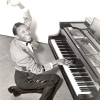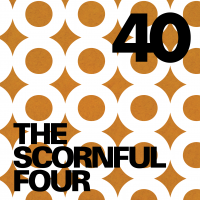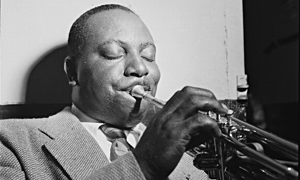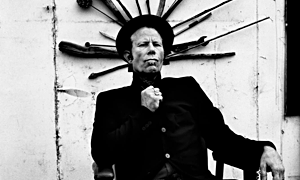Home » Jazz Articles » Book Review » Bangkok After Dark: Maurice Rocco, Transnational Nightli...
Bangkok After Dark: Maurice Rocco, Transnational Nightlife, and the Making of Cold War Intimacies
I'm not tired. So I stand up.
—Maurice Rocco
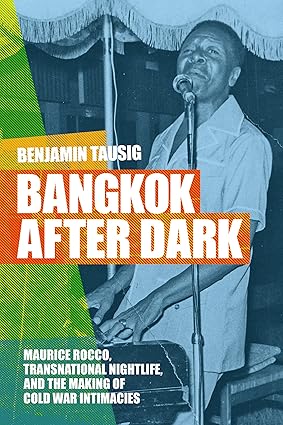 Bangkok After Dark: Maurice Rocco, Transnational Nightlife, and the Making of Cold War Intimacies
Bangkok After Dark: Maurice Rocco, Transnational Nightlife, and the Making of Cold War Intimacies Benjamin Tausig
264 Pages
ISBN: 978-1-4780-3170-3
Duke University Press
2025
You may have seen pianist-singer and entertainer Maurice Rocco in Incendiary Blonde (Paramount, 1945), the rags-to-riches story of Texas Guinan, the Waco-born daughter of immigrants who became a New York nightclub tycoon during Prohibition, starring Betty Hutton. No? Then check the extraordinary clip (below). He sings, dances and taps rhythm on the piano lid—all seemingly effortlessly—while his left hand rumbles a boogie-woogie bass as unstoppable as a freight train.
Standing (and dancing) at the piano had been Rocco's trademark since his childhood in Oxford, Ohio. With a wink, he gave reporters various fanciful reasons for his stance, including this puckishly simple one: "I'm not tired. So I stand up." In Cincinnati at WLW, dubbed 'The Nation's Station' for its powerful signal, his notice spread in the '30s through weekly broadcasts. And in the '40s, his "movie jukebox" Soundies served as a high-tech calling card that helped propel him to stardom for a time, landing him in rarified circles from Harlem to Hollywood, among such artists as Cab Calloway and Duke Ellington.
But as his star was rising, boogie-woogie, the genre of music he performed with such virtuosity, was slipping out of vogue, replaced by bebop and then rock 'n' roll. Nonetheless, as the clip of "Darktown Strutters Ball" (Shelton Brooks, 1916) demonstrates, his posture at the piano bears strong resemblance to that of Little Richard and Jerry Lee Lewis. Tausig makes a strong case for the influence of Rocco's proto-rock style on their personae, though neither acknowledged it. He was praised by contemporary cosmopolitan literati as well, including the writers Albert Camus and Jack Kerouac.
Any of this might have merited Rocco's admission into at least a few jazz history books, but that did not happen, for reasons Tausig elucidates in Bangkok After Dark.
As his star waned in the US, Rocco did what other Black (and queer) American musicians and artists had done and were doing—Josephine Baker, Sidney Bechet, Hazel Scott, James Baldwin and numerous others. He moved elsewhere. But where he finally found a hospitable new home in 1964 was not Europe, but Bangkok. Bangkok After Dark: Maurice Rocco, Transnational Nightlife, and the Making of Cold War Intimacies is, as its full title suggests, a personal tale that widens into a larger one. The book, as Tausig writes, is "at its core, about intimate Thai-American relationships during the Cold War." The tale is fascinating and complex.
Tausig moves between the US and Thailand as he narrates the story, beginning in Chapter 1 with Rocco's early life, his music and the rise of his career in the States, ending at the height of his fame. In Chapter 2, he jumps to Bangkok in the 1950s, focusing on the construction of a new and remodeled nightlife infrastructure there, which would support a massive influx of foreign visitors at the beginning of the Cold War period, particularly Americans. Chapter 3 covers essentially the same era, but as it relates to Rocco's career in the States, which was on the decline due to "factors ranging from the precarity of working in the culture industries, especially for Black artists, to the lingering effects of World War II on American nightlife." The chapter concludes in 1964, when he made the move to Bangkok for the considerable opportunities it offered as a viable "second act."
Chapters 4 examines the historical roots of Thai nightlife in the 1960s, at the time of the American war in Viet Nam, paying attention to its laborers (including musical performers, sex workers and "rental wives") and ways in which foreigners (farang), especially US GIs on R&R, who became "indispensable" to the Thai economy. Chapter 5 looks at the "invisible zones of Thailand's cosmopolitan nightlife culture, namely Black bars and the early emergence of a visible gay culture," ending in 1976, when US troops withdrew, leaving a "power vacuum" which was filled with violence and led to Rocco's tragic murder in March of that year.
The book concludes with the author's trip to Ohio in spring 2022, for the unveiling of a historical marker for Rocco in his hometown. As Tausig put it, "In Oxford, Rocco's memory matters enormously to the local community. This final chapter summons hope for a historical revision in which Rocco might be reimagined as a meaningful (if complicated) part of the history of jazz and rock and roll, of Cold War music in global circulation, and of the mobility of Black artists in the twentieth century."
The single extant recording of Rocco in Bangkok is a live take of "Don't Worry 'Bout Me" at the Bamboo Bar of the Oriental Hotel in 1965, which Doris Duke made on her personal tape recorder—now housed at the Doris Duke Audiovisual Collection at Duke University. As for the rest, Bangkok After Dark fills a significant gap, increasing the likelihood that both Rocco—with his first-rate talent and (for a time) high profile as a performer in the States—and the astonishing world he later inhabited in Thailand during the American war in Viet Nam, are remembered as we study jazz history.
Tags
Book Review
Maurice Rocco
Katchie Cartwright
Duke University Press
Waco
Betty Hutton
Oxford, Ohio
Cab Calloway
duke ellington
Shelton Brooks
Jerry Lee Lewis
Josephine Baker
Sidney Bechet
Hazel Scott
Bangkok
Little Richard
PREVIOUS / NEXT
Support All About Jazz
 All About Jazz has been a pillar of jazz since 1995, championing it as an art form and, more importantly, supporting the musicians who make it. Our enduring commitment has made "AAJ" one of the most culturally important websites of its kind, read by hundreds of thousands of fans, musicians and industry figures every month.
All About Jazz has been a pillar of jazz since 1995, championing it as an art form and, more importantly, supporting the musicians who make it. Our enduring commitment has made "AAJ" one of the most culturally important websites of its kind, read by hundreds of thousands of fans, musicians and industry figures every month.


